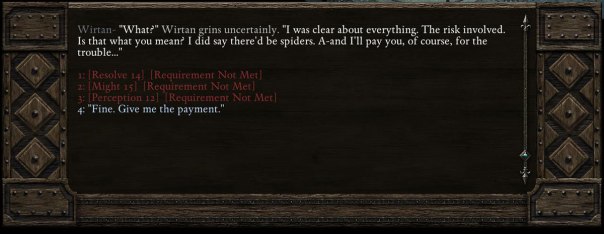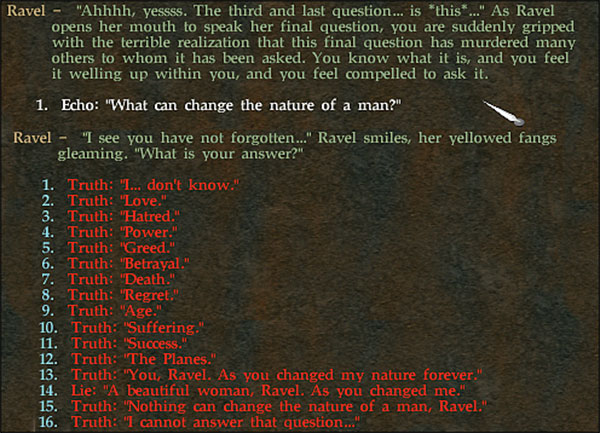Game Dialog Choice
I’m still slowly working my way through Pillars of Eternity, but this is starting to irk me greatly:
Pillars is not, of course, the first game to tie your in-game dialog responses to statistics or skills. Fallout 3 and Fallout: New Vegas come immediately to my mind, for example. But on reflection, I don’t really like it in those games either. I find Pillars a bit worse in this regard though, due both to how much more difficult it is to actually raise your abilities, and how this game is supposed to be a spiritual successor to, you know, stuff like this:
and this:
Ironically, Plansescape Torment also required certain attributes to be above an arbitrary threshold to unlock dialog options, so perhaps it is not the best of examples.
Or maybe it is. After all, the attribute breakpoints were invisible.
And I guess that is what annoys me the most: I do not understand the point of showing me dialog options I can never select. I don’t care that the other options would have only increased my quest payout by 100 copper, or saved me from one additional encounter, or given me an extra potion.
As a designer, what are you trying to communicate to me? The fact that I made poor decisions on the character select screen hours before actually playing your game? Are you trying to signal that certain skills will be important in the future? If so, are you giving me any tools or resources to achieve those thresholds later? I mean, clearly I can do nothing about these forbidden choices in the middle of the conversion, or even after I reload the game really. Or am I supposed to simply keep this in mind for some hypothetical second playthrough?
Truth be told, I was a bit miffed back in the day once I realized that most of the best dialog options in Planescape Torment were locked behind Wisdom 18+. But the game never rubbed my face in it, or otherwise treated dialog so… gamey.
Speaking of which: why are we all tying dialog to abstract attributes in the first place? For roleplaying purposes? To cause players to handicap themselves with useless Feats/Skills/Talents so players can’t be good at fighting and not fighting? Just give me my dialog choices and let me work things out from there. Or don’t and just not tell me about it.
This middle way is the worst of all worlds.
Posted on September 22, 2015, in Philosophy and tagged Black Isle, Choices, Dialog, Game Design, Pillars of Eternity, Planescape Torment. Bookmark the permalink. 6 Comments.



I’m almost certain there’s an option in the settings where it will not show dialogue choices you are unqualified for. Similarly, there’s an option to show what the results of your choices will be.
Now, whether the first option should be enabled by default is a different question. Sometimes if you don’t show players the choice, they will not realize the choice exists. If you make your character in certain fashion, you choose to not make it in a different fashion. Showing the dialogue choices allows you to validate your choices. Or in your case, feel bad about the choices you made.
I wrote something from the opposite perspective about Deus Ex: Invisible War.
LikeLike
Showing the dialogue choices allows you to validate your choices. Or in your case, feel bad about the choices you made.
I find it difficult to imagine a worse way to design a game; it’s precisely losing (or winning) on the character select screen, without even knowing you were making a blind choice to begin with. It was bad enough in the Witcher when it asks you to make a seemingly irrelevant choice and punishes you later, but Pillars punishes you for the entire rest of the game.
I do actually agree with your Invisible War example (even though I never played it) that a game can do a poor job at communicating that alternative paths/modes. The key difference is that you can change your method at pretty much any time – going from pure stealth to brute force, etc. You might have spent all your skills on sneaking, but at least you can shoot the guns. Unless you can’t, because gunplay is also locked behind certain skill thresholds. In which case I would say it’s bad.
If there are choices to make, let me make them. Each time I am presented with an option I’m forbidden to choose, I become less and less invested in the game narrative. I either have choices or I don’t. By the time I got to that Pillar’s conversation, the choice was illusory, as it had been made back on the character select screen.
LikeLike
What would make far more sense would be for all the options to be displayed but for the results of choosing those options to be affected by the level of your character’s relevant stats. For example, you could take the option that requires 15 MIght with the intention of threatening the questgiver into paying up but if your might was only 12 he might fail to be intimifated, if it was 10 he might laugh in your face and if it was 8 he might actually beat you up and steal your money.
That way you have your free choices but your stats still matter.
LikeLike
Let’s be honest: that’s just going to mean reloading and save-scumming.
I do think you may be onto something with partial successes/failures though. If the gradient is gentle enough, I might be fine with “losing the roll.” For example, if you needed Might 15 to get 100 extra copper, getting 50 extra copper for Might 13 could be good enough.
LikeLike
I really like this idea, provided the result isn’t random as Azuriel seems to think. If the option requires 15 Might and you choose it with less than that, then you always get an unfavorable result (partial success or not). Allowing save-scumming would totally ruin it for me.
I’m not sure whether I’d prefer that the requirement be shown or not, but either way I think it would be a better game system than either having options be completely restricted like in Pillars or completely unrelated to who your character is.
It’d be better than Pillars because it allows more freedom of choice, in the same way that allowing a stealth specialist character to attempt a difficult fight head on, where he’d be expected to fail.
And it would definitely be better than my vanguard Shepard being able to beat Garrus in a sniping challenge ¬¬
LikeLike
As mentioned, there is an option to hide this.
The point of allowing you to see it is that on your second/third playthrough, you can better see how different things could/can be with a different character. Having finishing the game twice now, I’d say creating two very different characters does raise the replay of PoE significantly, both for the combat and the quest progression/resolution.
I think this somewhat goes back to ‘playing it wrong’. If it bothers you to see options you are missing out on, use the tools provided you to disable it.
LikeLike